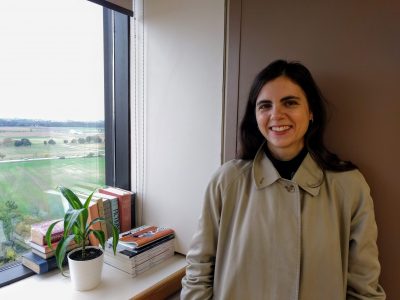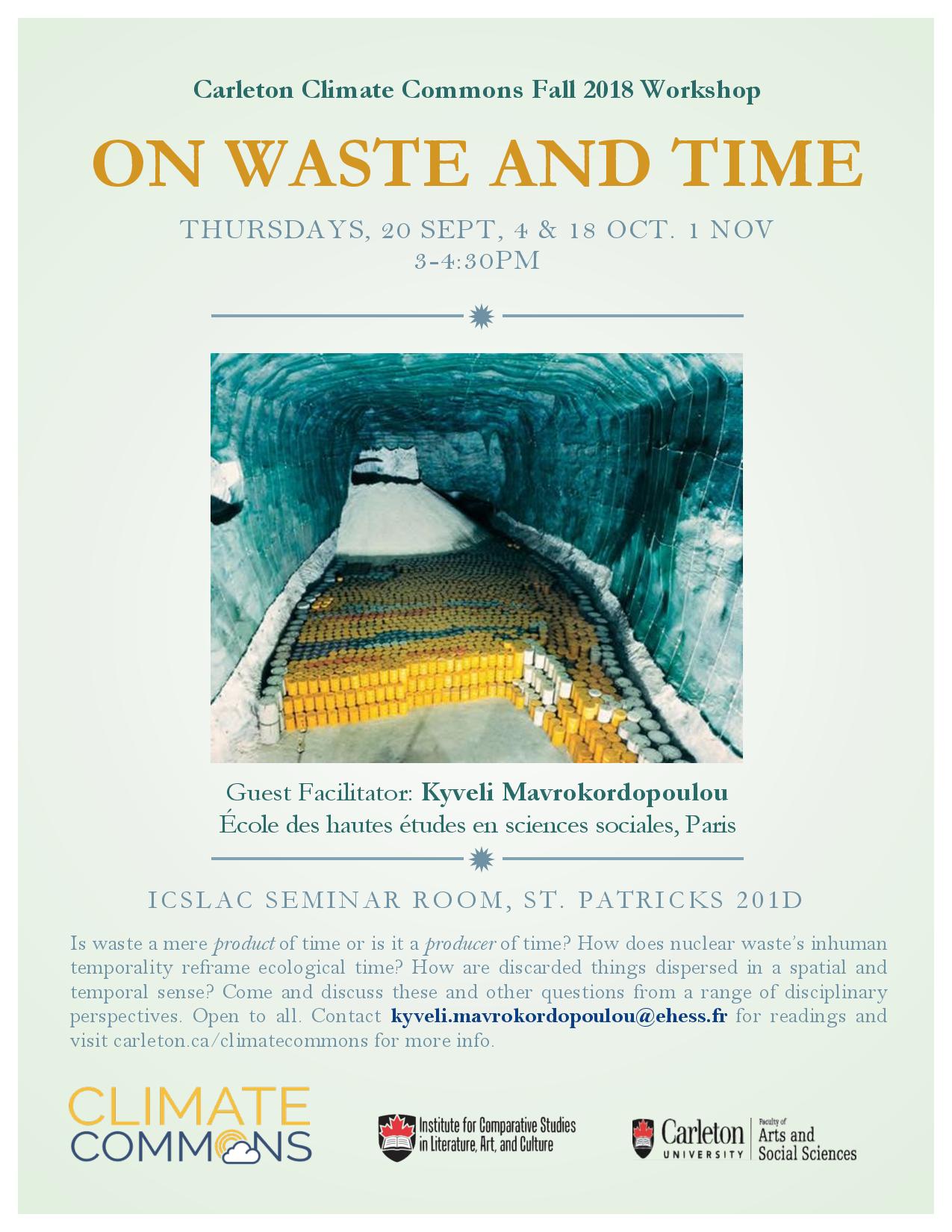Veronika Kratz, Carleton University
 Kyveli Mavrokordopoulou is a visiting scholar at Carleton from École des hautes études en sciences sociales in Paris. She is visiting for the fall with Carleton Climate Commons and the Institute for the Comparative Study of Literature, Art, and Culture. During this time she’s facilitating a workshop, “On Waste and Time,” which discusses waste, its temporal effects and the influence that time has in our perception of waste. I sat down to talk with her about her research and what she’s up to at Carleton in the coming weeks.
Kyveli Mavrokordopoulou is a visiting scholar at Carleton from École des hautes études en sciences sociales in Paris. She is visiting for the fall with Carleton Climate Commons and the Institute for the Comparative Study of Literature, Art, and Culture. During this time she’s facilitating a workshop, “On Waste and Time,” which discusses waste, its temporal effects and the influence that time has in our perception of waste. I sat down to talk with her about her research and what she’s up to at Carleton in the coming weeks.
Discussing her in-progress dissertation research, Mavrokordopoulou describes her work as looking at “artistic and cultural responses that seek to make tangible or confront the notion of deep time.” This realization of the age of the Earth represents “a shift in our perception of time,” which Mavrokordopoulou connects to current discussions surrounding the Anthropocene as a geological epoch – another perspective on time. Mavrokordopoulou is trained in art history, and so her work centres on various works of art which “look at how these perceptions of the deep past of the Earth are projected into the deep future in the context of climate change”. She is particularly interested in tracing how contemporary artists extend the time of the realisation of the work, rendering the artistic process beyond human control.
Currently in the third year of her PhD program, Mavrokordopoulou is writing the first section of her dissertation, which serves as the focus for the “On Waste and Time” workshop. In this area of her research, she’s looking at markers for deep geological disposal sites, which house high-level radioactive waste. These markers are an attempt to address the danger of nuclear waste, which remains toxic for billions of years, in human temporalities by building a kind of warning sign for the disposal sites.
One such marker is Testbed, a land art project proposal created in 2018 by Tei Carpenter. Through its use of air capture farms, Testbed “develops through time as a new material formation, like a sculpture in the making.” Testbed is composed of the build up of interactions between surrounding minerals at the site and CO2 to create a sculpture. Mavrokordopoulou explains that it actually uses CO2, another toxic matter like the nuclear waste, in a way that “doubles the disturbance” of the area. Mavrokordopoulou also makes it clear that her goal isn’t to “evaluate these works from a technological point of view,” or their effectiveness in warning against toxicity over time. Instead, she looks at the ideas around time and materiality that are opened by these works. For example, she points to the potential “blurring of the boundaries between human-made and nature-made, which is precisely what’s happening in a nuclear waste storage space.”
In coming to Carleton, Mavrokordopoulou is excited to work with other people interested in climate change research and how climate concerns are influencing scholarship across the humanities. That’s why, in facilitating her workshop, she hopes to explore the interdisciplinary application and impact of climate change into the manifestations of nuclear temporality and deep time—a conversation which opens up in her research. “It’s a topic that can bring people from very different fields,” she says, reaching those even outside of the university, such as those working in or involved with policy or activism. “I’m really interested in gathering these different people around the same table to discuss a topic that concerns us all in different ways.”
Mavrokordopoulou also hopes to highlight current work on waste being done at Carleton, such as the Heritage in Reverse Symposium happening at Carleton October 26-27th, which focuses on the relationship between architecture and heritage conservation and waste, demolition, and salvage. In fact, the next meeting of the workshop will centre on questioning architectural ruins as waste and their complex temporalities.
The “On Waste and Time” workshop is open to all, with three remaining sessions on October 4th, 18th, and November 3rd, to be held from 3-4:30PM in St. Patricks room 201D. Please email Mavrokordopoulou at kyveli.mavrokordopoulou@ehess.fr for access to the reading materials and to join what promises to be an intriguing—and important—conversation.
